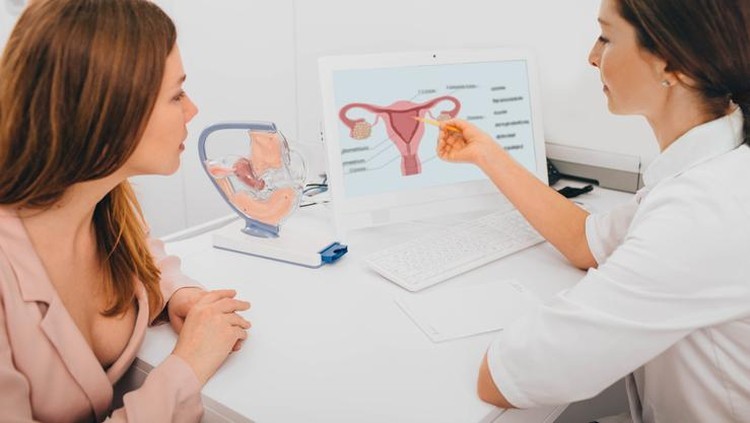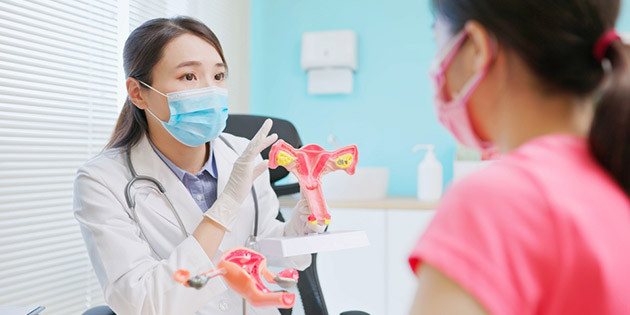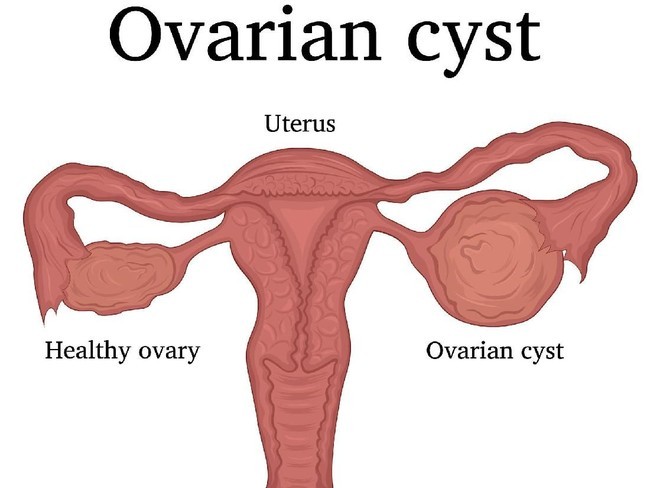Definition
Polycystic ovary syndrome (PCOS) occurs due to an imbalance in reproductive hormones. It is a fairly common condition that causes women to experience irregular menstrual cycles, excessive body hair growth, acne, and even infertility.
Women with PCOS may experience infrequent menstruation, which can occur every few months, or excessive menstruation that lasts for days. This happens due to an excess of androgen hormones in the body.
In PCOS patients, many small sacs develop along the edge of the ovaries. These small sacs are called cysts, which contain immature eggs. Normally, these sacs release a mature egg to be fertilized each month.
If fertilization by sperm occurs, a woman can become pregnant. However, if fertilization does not happen, the mature egg will shed, resulting in menstruation. In PCOS, the eggs do not function properly and are not released for fertilization each month.
PCOS is the most common cause of infertility in women. For instance, in the United States, PCOS affects 6–12% of women of reproductive age. In addition to the risk of infertility, women with PCOS are at a higher risk for diabetes, metabolic diseases, heart disease, and high blood pressure.
Causes
The exact cause of PCOS is still unknown. However, there is evidence that genetic factors play a significant role. Other factors influencing PCOS include:
Increased Androgen Levels
High levels of androgen prevent the ovaries from releasing eggs (ovulation), leading to irregular menstrual cycles. Irregular ovulation can result in the formation of small cysts in the ovaries. Additionally, high androgen levels can cause acne and excessive hair growth in women.
Insulin Resistance
Increased insulin levels can cause the ovaries to produce and release androgen hormones. Insulin controls how the body processes blood sugar and uses it for energy.
Insulin resistance is a condition in which the body cannot process insulin properly, leading to elevated blood sugar levels. Although not everyone with insulin resistance has high blood sugar or diabetes, insulin resistance can lead to diabetes.
Obesity can also cause insulin resistance. If insulin levels increase, even with normal blood sugar levels, it may indicate insulin resistance.
If you want to know more about diabetes, you can read it here: Diabetes Melitus - Definition, Cause, Symptom, And Treatment.
Inflammation
Women with PCOS tend to have a higher likelihood of experiencing inflammatory conditions. Healthcare providers can check for inflammation through C-reactive protein (CRP) tests and white blood cell counts.
Risk Factor
Risk factors for PCOS include diabetes (type 1, type 2, and gestational diabetes), a family history of PCOS, excessive sugar intake, a high-fat diet, and a sedentary lifestyle or lack of physical activity.
Symptoms
Some women notice PCOS symptoms when they first start menstruating, while others experience them after significant weight gain or when they have difficulty conceiving. Symptoms of PCOS include:
- Irregular periods. Most women with PCOS do not menstruate regularly once a month, and some may not menstruate at all for a year.
- Heavy bleeding. Due to irregular menstruation, the uterine lining builds up and can lead to heavy bleeding during menstruation.
- Excessive hair growth. Hair may grow in unusual areas like the back, stomach, and chest.
- Acne. Excess androgen can make the skin oilier, causing more acne.
- Weight gain. More than 80% of women with PCOS are overweight.
- Thinning hair on the scalp: Hair may become thinner and fall out.
- Darkened skin. Skin darkening occurs mainly in areas like the neck, under the breasts, and in the groin.
- Headache. Hormonal changes can trigger headaches in some women.
Diagnosis
Diagnosing PCOS requires a medical history, physical examination, and additional tests.
Medical History
The doctor will ask about the patient’s main complaint, accompanying symptoms, menstrual history, lifestyle, daily activities, past medical history, treatment history, and family medical history.
Physical Examination
The doctor will conduct a general physical examination, including checking blood pressure, body temperature, respiratory rate, and pulse. A pelvic exam may also be performed to assess reproductive organs if necessary.
Laboratory Tests
The doctor may recommend blood tests to check hormone levels, blood sugar, cholesterol, and white blood cell count if an infection is suspected.
Ultrasound (USG)
An ultrasound may be done to examine the ovaries and uterine lining. This can be performed through the vagina or rectum.
Management
Treatment for PCOS focuses on managing symptoms such as infertility, acne, and weight gain. Treatment includes lifestyle changes and medication.
Lifestyle Changes
Recommended lifestyle changes for PCOS patients include a low-calorie diet combined with moderate-intensity exercise. Reduce the intake of fatty and high-sugar foods and increase protein consumption. Combining diet and activity can help reduce weight and regulate hormone levels.
Other Therapies
Additional therapies may be used to regulate menstrual cycles. The doctor may recommend the following medications:
- Combination birth control pills. Pills containing estrogen and progesterone can lower androgen levels, improve menstrual cycles, reduce the risk of endometrial cancer, and decrease excessive hair growth and acne.
- Progestin therapy. Progestin functions similarly to combination birth control pills.
- Electrolysis and laser therapy. These therapies can be used to reduce excessive hair growth, causing the hair to fall out and not grow back.
- Acne treatment: Topical treatments, creams, and oral medications can treat acne associated with PCOS. Consult a dermatologist for further treatment options.
Other medications, such as hormone injections, anti-estrogen drugs, breast cancer medications, and diabetes drugs may also be options. These are prescribed according to the patient’s condition and doctor’s recommendation.
Complications
Complications from PCOS include:
- Gestational diabetes or high blood pressure during pregnancy
- Miscarriage
- Premature birth
- Liver inflammation
- Metabolic syndrome
- Type 2 diabetes or prediabetes
- Sleep disorders
- Depression, anxiety disorders, eating disorders
- Endometrial cancer
- Infertility or difficulty conceiving
If you want to know more about infertility in women, you can read them here: Infertility In Women - Understanding, Cause, Symptoms, And Treatment.
Prevention
You can prevent PCOS by recognizing risk factors early and adopting a healthy lifestyle, such as:
- Reducing carbohydrate intake
- Reducing fatty foods
- Increasing protein intake
- Increasing physical activity
- Exercising at moderate intensity at least 3 times a week for 30 minutes
- Avoiding smoking and alcohol consumption
When to See a Doctor?
Consult a doctor if your menstrual cycle is irregular. A cycle is considered irregular if menstruation occurs more than 40 days apart and persists continuously.
Looking for more information about other diseases? Click here!
- dr Anita Larasati Priyono
Cleveland Clinic - Polycystic Ovary Syndrome. (2021). Retrieved 26 October 2022, from https://my.clevelandclinic.org/health/diseases/8316-polycystic-ovary-syndrome-pcos.
Mayo Clinic - Polycystic ovary syndrome. (2022). Retrieved 26 October 2022, from https://www.mayoclinic.org/diseases-conditions/pcos/symptoms-causes/syc-20353439.
WebMD - Polycystic Ovary Syndrome. (2022). Retrieved 26 October 2022, from https://www.webmd.com/women/what-is-pcos.











